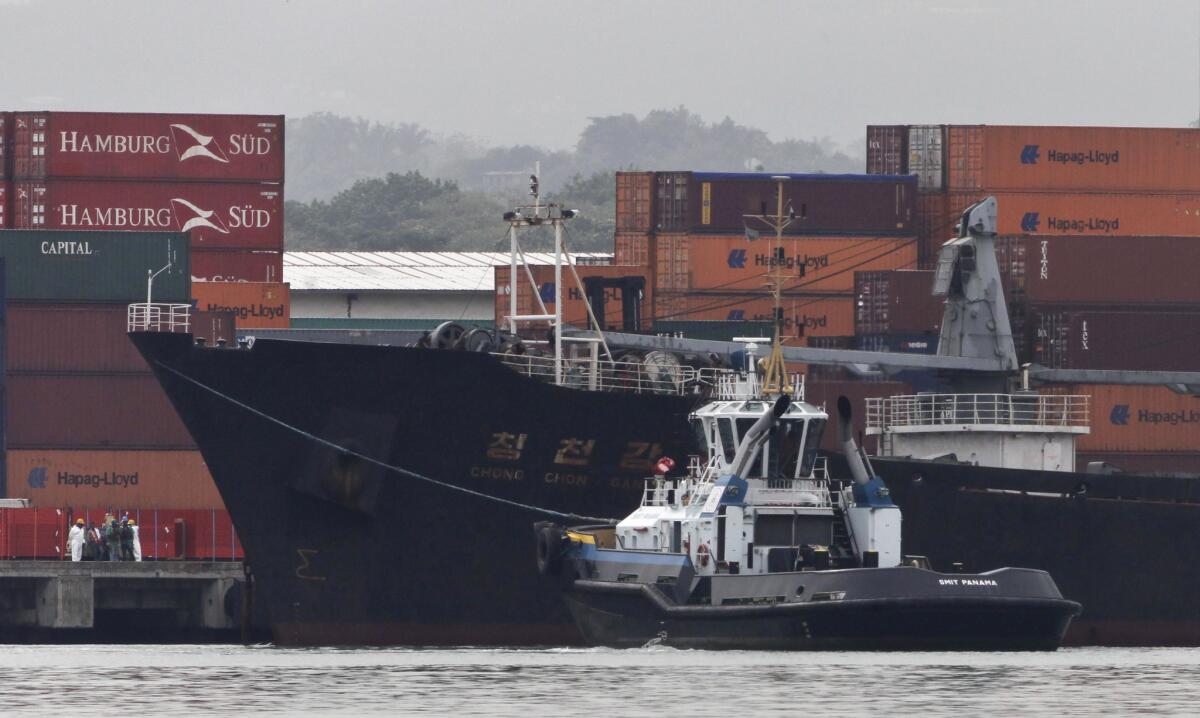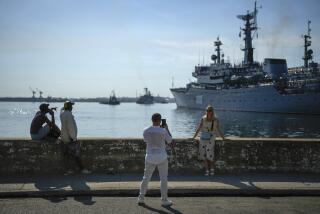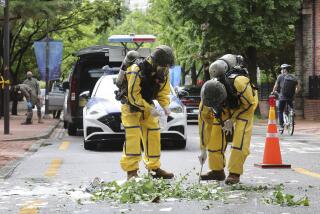N. Korea-Cuba drama boils down to useless weapons, big pile of sugar

As anti-drug-trafficking agents closed in on a North Korean freighter about to enter the Panama Canal this month, the crew from the rogue communist country took evasive action.
They sought to outrun the swift Panamanian patrol boats with their 450-foot tramp steamer, loaded down with at least six containers of antiquated Cuban air-defense equipment hidden under 10,000 tons of bagged sugar. They pushed back investigators in a vain effort to prevent being boarded. They sabotaged the ship’s crane to hinder the searchers’ access to the cargo. The captain was variously reported to have had a heart attack and to have attempted suicide.
The crew’s histrionics were probably intended for domestic consumption. North Korean authorities ensure the return of their ill-paid sailors by holding the threat of labor camp detention over their families back home. To avoid punishment for letting the ship fall into the hands of a U.S. ally, the crewmen put up what looked like a valiant fight.
U.S. politicians representing the stridently anti-Castro Cuban communities in Florida and New Jersey were quick to claim the incident as evidence that Cuba should remain on Washington’s blacklist of state sponsors of terrorism.
But what other analysts saw in the interception was testimony of an entirely different nature: a North Korean government so impoverished it is reduced to taking rag-and-bone work from Cuba for payment in sugar, and a Cuban economy so devastated that it can’t afford to replace aircraft and weapons so outdated that the Pentagon has declared them incapable of posing a threat.
Investigators were still combing through the vast holds of the docked freighter Thursday but have so far found only components of what Cuba readily confessed was its materiel being sent to North Korea for repair and upgrade. In a statement issued Tuesday by Cuba’s External Affairs Ministry, Havana said the cargo consisted of two MIG-21 aircraft, 15 MIG engines, two antiaircraft missile batteries and the disassembled components of nine missiles. The Cuban statement described the cargo as “obsolete.”
The weaponry destined for North Korea is of 1950s origin, said Philip Peters, president of the Cuba Research Center in Virginia.
“This appears to be a violation of the U.N. resolution [banning weapons trade with North Korea]. But in military terms it has almost no significance at all,” Peters said. “What this incident says about Cuba is that there aren’t a lot of places where you can go to get these old airplanes and antiaircraft systems fixed.”
Cuba has been engaged in quiet efforts to improve relations with the United States in recent months. Coincidentally, on Wednesday, Cuban and U.S. negotiators on migration issues had their first meeting after a 2 1/2-year hiatus. The one-day talks took place in spite of the weapons shipment incident and the appeals by Cuban American lawmakers to retain a hard line against Havana.
A State Department spokeswoman, Marie Harf, told journalists that the Obama administration had informed Cuban officials that they would want to discuss the seized cargo but only after Panamanian investigators completed their search. Authorities said Thursday that could take another week to 10 days.
The suspect military systems on board the Chong Chon Gang freighter were buried under 200,000 sacks of raw sugar that was the Cubans’ barter payment to the North Koreans for taking on the pickup, repair and delivery job.
At current sugar prices, the compensation is worth about $3.2 million, said Jeffrey Lewis, director of the East Asia nonproliferation program at the Monterey Institute of International Studies.
Minus fuel costs for the two transoceanic voyages between Havana and the North Korean port of Nampo, and the paltry wages paid the sailors and weapons repair crews in Pyongyang’s unconvertible currency, the job would seem hardly worth the trouble. It is nevertheless attractive to the isolated and cash-strapped North Koreans, Lewis said.
For Cuba to send its militarily insignificant weaponry to its communist ally violates the letter of the U.N. sanctions imposed for Pyongyang’s defiant quest for nuclear weapons, “but only in the most legalistic way,” Lewis said.
The barter arrangement for compensation makes it politically difficult for countries to enforce the U.N. sanctions against North Korea because they are seizing food destined for a country where starvation and malnutrition have taken hundreds of thousands of lives in recent years, he said.
“Enforcing sanctions is politically difficult for our allies. A lot of countries feel like, ‘This is your problem – North Korea isn’t going to nuke us!’ ” Lewis said. “Panama is a special case because they have a president [Ricardo Martinelli] who likes to show up and participate in big drug busts. They were wrong about there being drugs on board, but the weapons still gave him an opportunity to stage a big PR event.”
Whether the United States and its allies will push for U.N. censure of Cuba for technically violating the sanctions on North Korea depends somewhat upon the results of the search, analysts say.
“The administration is going to wait until the whole search has been concluded before it decides what to make of this,” said Peters. “But so far it has no reason to doubt that the materiel on board is other than what the Cubans have described – a bunch of old stuff that poses no threat to us.”
ALSO:
Syria’s ravaged children: War misery told by the statistics
Nelson Mandela’s 95th birthday: A time to remember in Soweto
Conviction of Russian opposition leader Alexei Navalny ignites protest
A foreign correspondent for 25 years, Carol J. Williams traveled to and reported from more than 80 countries in Europe, Asia, the Middle East and Latin America.
More to Read
Sign up for Essential California
The most important California stories and recommendations in your inbox every morning.
You may occasionally receive promotional content from the Los Angeles Times.











